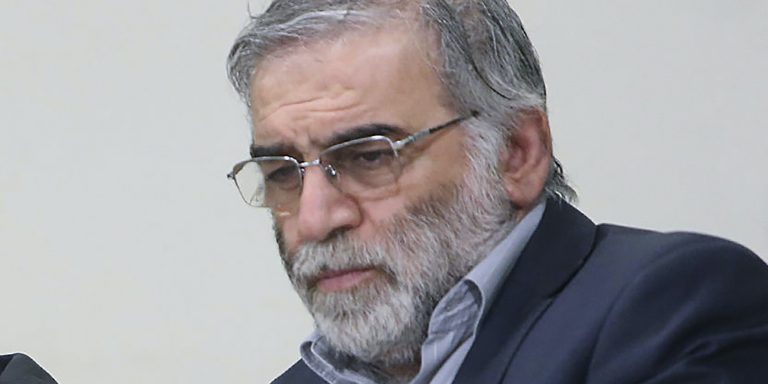INTELBRIEF
November 30, 2020
IntelBrief: Iran’s Top Nuclear Weapons Scientist Assassinated

Bottom Line up Front
- The assassination of the head of Iran’s illicit nuclear weapons program, Mohsen Fakhrizadeh, fits a pattern of recent covert operations inside Iran.
- The likely perpetrator of the assassination, Israel, seeks to disrupt Iran’s nuclear program before the incoming Biden administration takes office.
- While still extrajudicial and unilateral, the covert action is a less bellicose alternative to a U.S. or Israeli direct military strike on Iran’s nuclear facilities, also reportedly considered.
- Despite threats to the contrary, Iran will likely forego major retaliation in order to avoid derailing the plans of the Biden administration to re-engage with Tehran and ease sanctions.
On November 27, assassins attacked the car of and killed the top official of Iran’s now-suspended nuclear weapons program, Mohsen Fakhrizadeh. Fakhrizadeh had been under U.S. and United Nations (UN) sanctions for his involvement in Iran’s nuclear weapons research efforts, which the UN assessed was suspended in 2003, but which recent evidence suggested might have continued beyond that time. The assassination appears to fit a pattern of attacks in Iran that have been attributed to Israeli intelligence, including: the killing of four Iranian nuclear scientists in 2010-2012; the seizure of a trove of nuclear documents in a clandestine raid on a Tehran warehouse in 2018; and an explosion at an Iranian nuclear facility in July 2020. Iranian leaders immediately accused Israel of the assassination and vowed to avenge Fakhrizadeh’s death, similar to Iran’s vow of revenge for the U.S. strike in January 2020 that killed the revered Islamic Revolutionary Guard Corps – Qods Force commander, Qasem Soleimani.
Israel’s leaders undoubtedly recognize that the incoming Biden administration, which seeks to return the United States to the 2015 multilateral nuclear deal, will discourage any Israeli actions – military or covert – against Iran’s nuclear infrastructure. The apparent Israeli covert operation against Fakhrizadeh would seemingly represent an effort to deal a significant blow to Iran’s nuclear efforts before the Trump administration leaves office. Yet, the assassination constituted a less bellicose alternative to an air strike on Iranian nuclear facilities that both the Trump administration and Israeli Prime Minister Benjamin Netanyahu reportedly considered. De-facto Saudi leader, Crown Prince Mohammad bin Salman, reportedly balked at a suggestion by Netanyahu, in the first ever direct Saudi-Israeli leadership meeting in late November, that Saudi Arabia back an Israeli military strike on Iran’s nuclear facilities. That meeting was purportedly facilitated by the outgoing Secretary of State Mike Pompeo, who has urged the incoming administration to continue the Trump administration’s maximum pressure campaign against Iran. The Saudi Crown Prince might have feared that such a strike would cause Tehran to retaliate not only against Israel but also against the Kingdom, perhaps by repeating the devastating September 2019 Iranian missile assault on Saudi oil infrastructure.
Although there will be pressure by Iran’s hardliners to retaliate forcefully, Iranian leaders will weigh heavily the potential for Iranian action to interfere with a Biden administration return to engagement and negotiations with Iran. Stoking new U.S.-Iran conflict might have been the core intent of the Israeli operation against Fakhrizadeh, insofar as Netanyahu strongly opposes the Biden administration’s plans to rejoin the 2015 Iran nuclear deal that the Trump administration abrogated. In order not to derail diplomacy with Biden, Tehran will likely proceed cautiously and slowly with any retaliatory steps. Still, the menu of options available to Tehran include activating its many regional proxies to attack U.S. and allied targets in the region. There is also potential for Iran to strike Israeli and U.S. targets in Europe or Asia. Iran could also seize more Westerners as hostages, which Iran has found to be a useful bargaining tool with the United States and European governments.
It is also likely that Iran will use the Fakhrizadeh assassination as a justification to escalate its demands in any new talks with the Biden administration on a U.S. return to the nuclear agreement. Such negotiations will be necessary, given that additional sanctions have been imposed since the deal went into effect in 2016 and Iran has built new nuclear facilities; these new features would need to be addressed in any U.S. return to the nuclear accord. It is conceivable that Iran will demand additional sanctions relief beyond what was provided for in the 2015 accord. Yet, increasing its demands might complicate efforts by the new U.S. president to garner the requisite U.S. political support to rejoin that deal, which did not have clear majority support in the United States at any time.